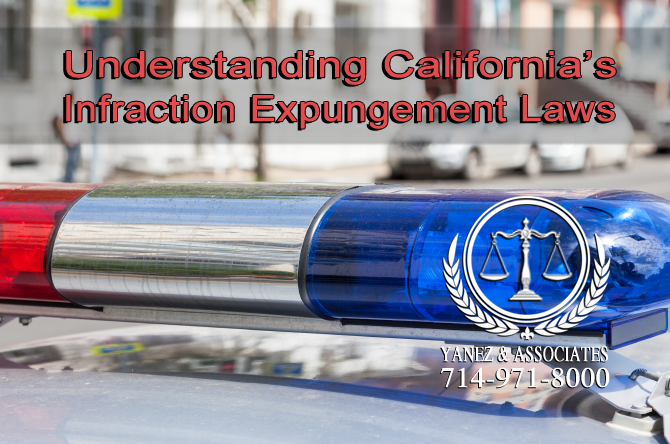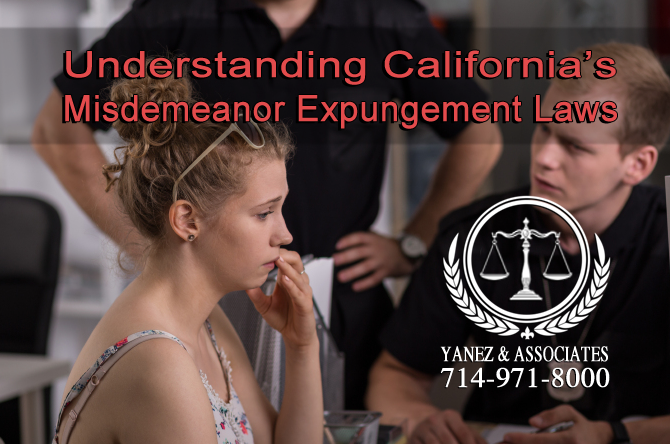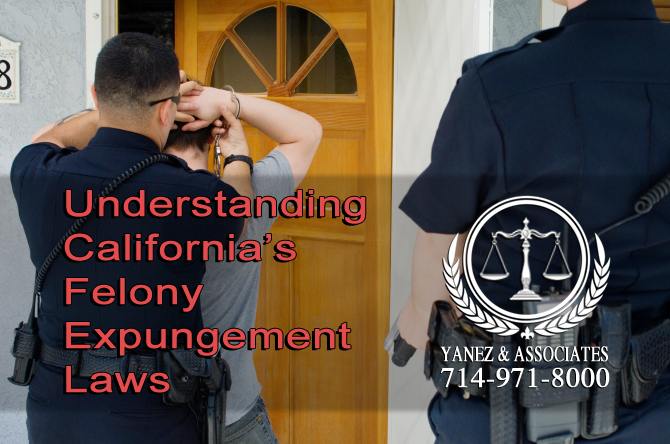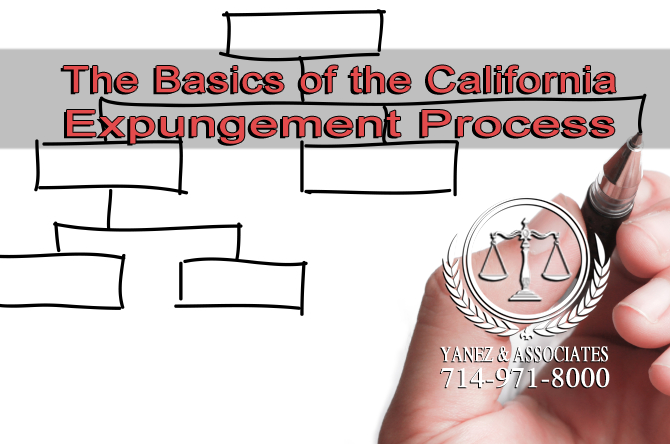Felony, Misdemeanor and Infraction Expungement Lawyers in Orange County, CA
FAQ: about Felony, Misdemeanor and Infraction Expungement Laws
Here in California, criminal offenses are divided into three different types: infractions, misdemeanors and felonies. Infractions are criminal offenses that involve most moving and traffic violations, in addition to a few specific criminal offenses. Misdemeanors are lesser crimes that are punishable by at most a one-year sentence in a California county jail. Felonies are the most serious of the three offenses, and are punishable by a sentence of imprisonment in one of California’s state prisons, and even death in the most extreme violent crimes. Convictions for an infraction, misdemeanor or felony offense are added to your criminal record, which could potentially negatively affect your employment and housing prospects. However, you may potentially be eligible for expungement, which if approved would have your original case reopened and the previous conviction dismissed.
Expungement is the official legal process of having a criminal conviction removed or dismissed from your criminal record. While some stat expungement laws allow for the complete removal of your conviction from your criminal record, California only allows for a conviction dismissal. As a result, here in California the expungement of a conviction results in a note being added to your criminal record stating that the previously entered conviction was dismissed, though the original conviction will remain on your record. Your ability to be eligible for a conviction dismissal will be dependent on the type of crime committed, and whether or not you fulfilled all of the requirements of your sentencing.
Understanding California’s Infraction Expungement Laws

What are California’s Infraction Expungement Laws
Infractions, commonly referred to as “violations” are petty offenses that typically do not result in a sentence of jail time. Instead most infractions are typically punishable by the payment of fine and/or an order to perform community service. The common infractions punishable under California law include:
• Marijuana possession
• Trespassing
• Specific types of fraud
• Petty larceny and/or theft
• Disturbing the peace
• Failure to appear before the California’s courts
• The purchasing of alcohol by a minor
Though relatively minor in nature, infractions will remain on your criminal record unless you submit a Petition for Dismissal that is approved by a California court. Your infraction will be eligible for expungement if:
• At least a year has passed since your infraction sentencing;
• Your have paid all of the fines, restitution and fees that were required as part of your sentencing;
• You are not presently being charged with a separate offense; AND
• The infraction at issue was not vehicular in nature.
Understanding California’s Misdemeanor Expungement Laws

What are California’s Misdemeanor Expungement Laws
Misdemeanors are criminal offenses that are more serious in nature then infractions, and are punishable by a sentence of up to one year in jail, and an order to pay fines. Some of the more commonly prosecuted misdemeanor crimes include:
• Driving while under the influence of drugs and/or alcohol
• Petty theft
• Driving with a suspended drivers’ license
• Vandalism
• Simple assault or battery
Under California law, you may be eligible to have your misdemeanor conviction expunged if:
• Your misdemeanor conviction was prosecuted in a California state court;
• You either completed your probation sentence, or if no probation was ordered, it has been at least one year since your misdemeanor conviction;
• All ordered misdemeanor fines have been paid;
• There presently exist no open charges on your criminal record; AND
• Your misdemeanor conviction was not federal in nature.
Understanding California’s Felony Expungement Laws

What offenses are included in California’s Felony Laws?
Here in California, felonies are the most serious class of criminal offenses that come with a sentence of imprisonment of longer than one year. Felony offenses include a wide assortment of violent and white-collar crimes, including:
• Murder
• Rape and other sexual crimes
• Selling a controlled substance
• Burglary and robbery
• Aggravated assault and battery
• Hit and runs
• Embezzlement
It is extremely difficult to have a California court approve a request for the expungement of a felony conviction. In fact, the only felonies capable of being expunged are those that resulted in a sentence of imprisonment in a California county jail. Those who have served time for a felony conviction in a California state court are ineligible for expungement. However, an alternative to expungement, known as a Certificate of Rehabilitation can be granted in certain circumstances.
Though a Certificate of Rehabilitation does not result in the dismissal of your conviction, it does provide you with written confirmation that you did not break any laws following your prison sentence. You also have the option to petition the court to reduce your felony down to a misdemeanor criminal charge, which could ultimately allow you to pursue the expungement process. However, the ability to reduce a felony down to a misdemeanor is not allowed in cases of sexual offenses, felony manslaughter and murder.
The Basics of the California Expungement Process

What is the basic Basics California Expungement process
California Penal Code section 1203.4 governs the expungement conviction dismissal process. Under section 1203.4, a Petition for Dismissal must be submitted to a California court in order to officially request the expungement of your criminal conviction. The information that must be contained within this petition includes a detailed explanation of the conviction that you are requesting dismissal for. Before submitting a Petition for Dismissal it is important to determine whether your conviction is in fact eligible for expungement. As previously mentioned, most infractions and misdemeanors are eligible for expungement if all of the terms of the conviction sentencing were fulfilled and you are not presently being charged for an additional offense, or serving probation for a separate offense. However, felony offenses are extremely difficult to have expunged, and expungement is not possible at all if you were sentenced to a California state prison.
Contact Yanez & Associates’ Orange County Felony, Misdemeanor and Infraction Expungement Attorneys

Do I need to consult with an attorney in order to determine my eligibility for a Felony, Misdemeanor or Infraction Expungement?
Given the complex legal issues and laws involved, expungement eligibility may be difficult to determine on your own. As a result, consulting with a licensed California expungement attorney is advisable so that you can understand whether or not your conviction is eligible for expungement. Give Yanez & Associates a call today to discuss the legal solutions we can provide in your expungement case.








